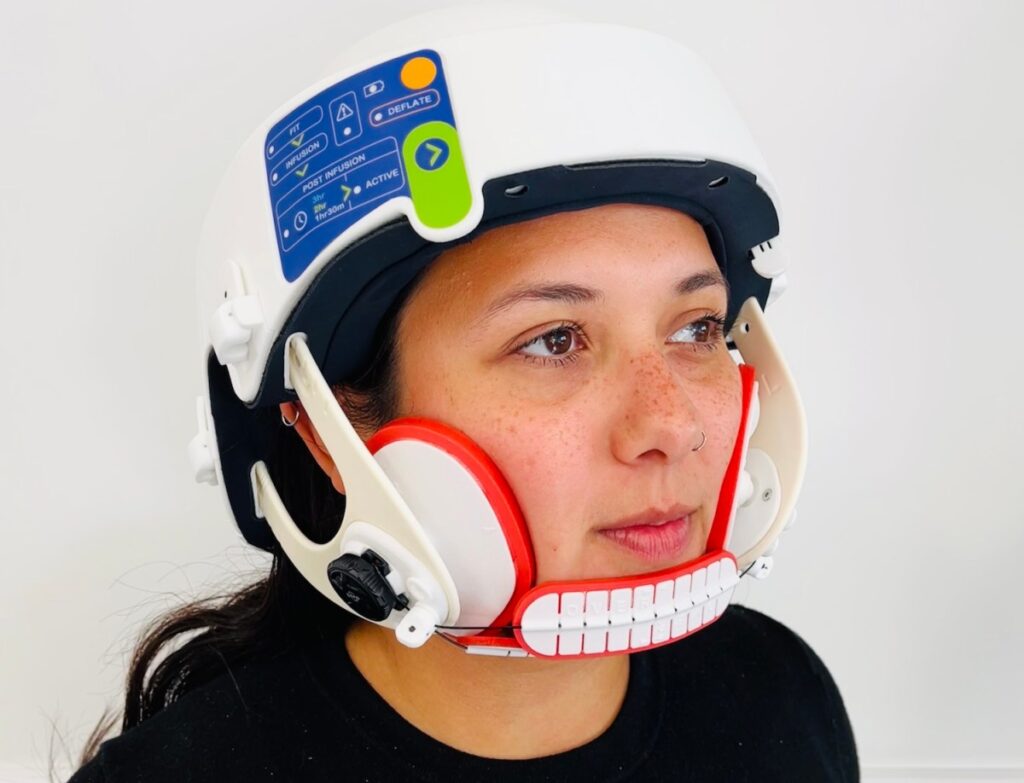Luminate's wearable device, which helps preserve hair during chemotherapy, is still undergoing the testing necessary for commercial release, but the startup is already looking toward its next goal: bringing cancer treatment to the home. A new $15 million funding round should help it get started on making that goal a reality.
This startup is one of the most unusual yet promising we've covered in 2021. Its pitch sounds a bit like sci-fi: a helmet called “Lily” that people undergoing chemotherapy wear to prevent hair loss, a common side effect of the treatment.
It sounds like magic, but it's actually quite simple: The helmet applies pressure evenly across the scalp, blocking capillaries and preventing toxic chemotherapy drugs from reaching patients' hair follicles. In the company's initial tests, this was enough to prevent hair loss in 75% of people, explained CEO and founder Aaron Hannon.
“We've had some patients who have had a full head of hair even after four to 12 chemotherapy treatments, and we've had great feedback that it's transformed their treatment experience,” Hannon said. Testing also revealed few safety, comfort or device issues, and that the longer the helmet is worn, the better the results. While this is the best they can hope for, with a small patient population, Luminate needs to work harder to make its U.S. debut.
“The next step is a multicenter study to gain FDA approval in the U.S. We are inviting centers in New York, Florida and possibly Ohio to test the technology,” Hannon said. The study will involve 85 patients and will last seven to eight months, and could begin in November.
Luminate has a lot going on beyond the tedious FDA approval process. Its success in the oncology space has given the team new opportunities to help patients during treatment.
 Luminate founders (left to right): Aaron Hannon, Barbara Oliveira, and Martin O'Halloran. Image courtesy of Luminate
Luminate founders (left to right): Aaron Hannon, Barbara Oliveira, and Martin O'Halloran. Image courtesy of Luminate
Hannon said the team identified chemotherapy-induced neuropathy (essentially peripheral nerve damage) as another common side effect that could potentially be mitigated with the same pressure technology. It's essentially precision compression socks or gloves, and while those garments already have some effect, the wearable device the team is working on would do so in a predictable and precise way.
Very similar in concept to Lily, Lilac (as the glove-boot combination is called) makes sense to pursue as Luminate's next medical device, since a lot of the work has already been done: “It took about two years from preclinical to complete the first patient trials showing efficacy for Lily, compared with one year for Lilac,” Hannon said.
 Lilac glove and boot prototypes in use. Image courtesy of Luminate
Lilac glove and boot prototypes in use. Image courtesy of Luminate
This also fits into the larger, long-term strategy and goal of bringing cancer care to homes.
Oncology relies heavily on specialized equipment, usually found in care centers. But for many patients, going to the hospital can be difficult, time-consuming, and even painful. All home care should be done at home, but chemotherapy is impractical because of the way it is administered. Not only that, but a two-hour session can take up to four to five hours in total, due to pre-infusion blood tests and paperwork.
But as cancer diagnoses get younger and treatments get longer, care centers may not have enough seats to treat the desired number of people in a timely manner (and delays will have adverse effects). Short of spending a lot of money to build more chemotherapy seats, what can be done?
“Our goal right now is to be able to provide cancer treatment in the home,” Hannon said, explaining that while that's still a long way off, the company is working on developing ways for patients to administer their own blood tests, pre-infusion evaluations, and the actual chemotherapy.
Of course, this is still far from finished, and Hannon made it clear that the company is in no rush to do anything. [patients] “We're looking at ways to give patients the ability to draw their own blood and administer chemotherapy at home in an easy and safe way. We're looking at things like auto-injectors to access existing subcutaneous ports.”
Just as at-home care for other chronic and acute illnesses has become more common, Luminate hopes that at-home cancer treatment will become more practical as companies invest in it.
Luminate plans to spend $15 million in Series A funding, a new funding round led by Artis Ventures, with participation from Metaplanet, Lachy Groom, 8VC, SciFounders, Faber, and several individuals.
Hannon said that in the near future, the company will be expanding its clinical presence in the U.S., including adding teams for testing, training and marketing, as clinical trials progress.



